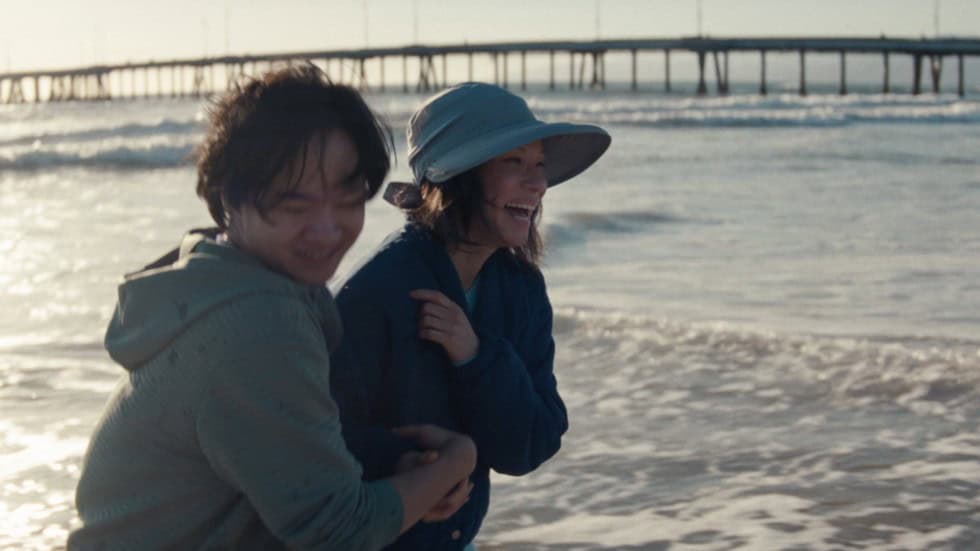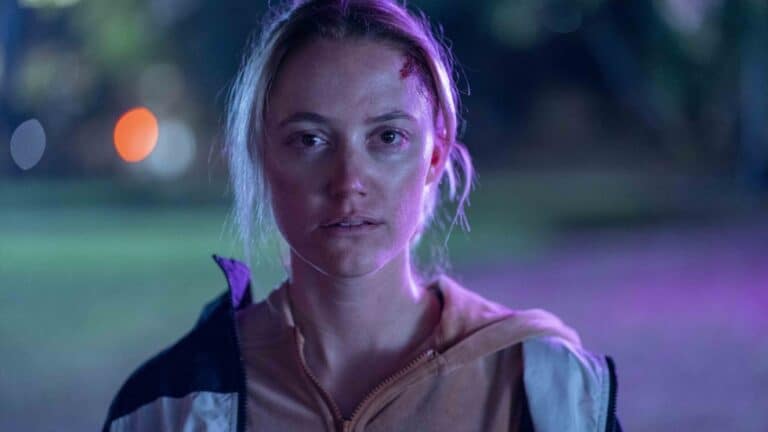Rosemead (Tribeca 2025) Film Review & Summary
Rosemead goes beyond giving Lucy Liu a rarefied role and highlights mental health in the Asian community as rarely seen.

Spoiler Alert: This summary and review contains spoilers.
Additionally, some images and text may include affiliate links, meaning we may earn a commission or receive products if you make a purchase.
“Rosemead” Film Details
- Runtime: 1 Hour(s) and 37 Minutes
- Seen Via: Film Festival – Tribeca Film Festival | Press Screening
- Released On: In Theaters
- Public Release Date: June 6, 2025 (Get Tickets)
- Director(s): Eric Lin
- Writer(s): Marilyn Fu
- Based On Work By: Frank Shyong
- Primary Language: English, Contains Non-English (Mandarin)
- Genre(s): Drama
- Rating: Not Rated
Summary
For almost a year, Irene has been a widow, and while she still has a decent handle on things regarding her printing business, her personal life is another matter. She is fighting a losing battle with cancer and her son, Joe, potentially from the trauma of witnessing his father’s death, has developed a form of schizophrenia as aggressive as Irene’s cancer.
However, while Irene has a community to help her and has tried to embrace Western medicine to address the challenges in her life, it may not be enough, and she comes to realize that she may have to take a step further to own all that she is responsible for.
Cast and Characters
Irene (Lucy Liu)
- Check out other productions we’ve covered starring this actor: [Link to Actor’s Tag]
- Character Summary: Irene, after the death of her husband, has become a single mother and between a full-time job running a printing shop and both monitoring and trying to facilitate the help her son needs, she is overwhelmed. Add in having an aggressive form of cancer, and Irene is at her limits, and it seems she has nowhere to turn to for long-term solutions.
Joe (Lawrence Shou)
- Check out other productions we’ve covered starring this actor: [Link to Actor’s Tag]
- Character Summary: At one time, Joe was an exemplary student and top athlete on the swim team, but it appears that seeing his father’s final moments may have been the cause of his developing schizophrenia. Now, thankfully, his mother is seeking professional help, but with a recent fixation on a certain type of horrific events, it is unclear if Irene has enough help to keep her son in line.
What To Expect In “Rosemead” (Not Rated) – Content Overview
- Dialog:
- Cursing: Mild
- Violence:
- Gun Violence: Present
- Violence Against Children: Yes
- Domestic Violence: Yes
- Gore/ Blood: Light
- Graphic Imagery
- Sexual Content: Nothing Notable
- Miscellaneous:
- Drinking: Yes – Underage
- Vermin: Insects – Spiders
Links
- Check out our movies page for our latest movie reviews and recommendations.
- Link To Article “A dying mother’s plan: Buy a gun. Rent a hotel room. Kill her son” Rosemead is based on
- More Coverage Of The Tribeca Film Festival 2025
Review and Commentary
Highlight(s)
Knowing It Is Based On A True Story Makes It Hit Harder [83/100]
I’m of the belief¸ that if Rosemead wasn’t based on a true story, it would lose a lot as a film. For knowing that Joe and Irene exist makes each moment feel more rooted in reality than for the sake of entertainment. In trying to capture the feelings of helplessness or Joe’s episodes, it is easier to remove that it is Lucy Liu on screen, speaking with an accent you rarely, if ever, hear her use, and this is a woman who found herself, within a little more than a year, living nearly every nightmare imaginable and it all hitting her all at once.
Identity vs. Culture [82/100]
Like Black people and Latinos, Asian people aren’t a monolith. However, when it is usually depicted on screen, as in the movie Joy Ride, it is often portrayed through a comedic lens. So when it comes to Rosemead, it was interesting to watch Irene, as she explored western medicine, like therapy and pills, deal with the push and pull of exploring alternatives to traditional medicine. As an example, Irene and Joe’s psychologist come to words as he pushes her beyond what she is comfortable with, and there is a need to remind him that they may look similar, but they aren’t the same.
Now, whether Irene meant to frame Joe as an ABC (American Born Chinese) in contrast to herself, who is from Taipei, isn’t explicitly clear. However, throughout Rosemead, it’s evident that she’s caught between the need to try something new, for both her and Joe’s sake, and honoring the traditions she was raised with. She hasn’t given up on her roots, nor is she dismissing them, but there’s a clear internal tension.
In many cultures, particularly among people of color, there’s an unspoken rule not to say or do certain things in front of outsiders, and Liu plays Irene as someone aware of this code, even as desperation forces her to bend it. Her approach with the psychologist, her subtle resistance to the community’s whispers, and even her polite acceptance of traditional remedies like herbal teas (often only consumed after noting an ailment) all highlight how carefully she navigates these cultural expectations as Irene.
In addition, Marilyn Fu’s writing aims to balance the universal struggles of Irene with making Rosemead a story about a specific Asian woman who, rather than rejecting her upbringing, is trying to hold onto her beliefs while acknowledging that they may not be enough on their own.
Now, I will admit, a part of me wishes we got to see Irene’s journey from potentially going from the idea that Joe was taken by a dark spirit to him having a neurological disorder, or even learning that she never believed in that stuff in the first place. However, even without the backstory of how she ended up seeking assistance elsewhere, it made for an interesting means to show Irene, not as progressive, but as understanding that her way can’t be the only way.
How Rosemead Depicts Schizophrenia [85/100]
The depiction of mental illness, generally, has been something found in horror movies and niche, often marketed towards accolades, dramas. Because of this dichotomy, it has made certain illnesses, especially neurological disorders, like schizophrenia, demonized, and with Rosemead, there is a fine line. It makes clear that those with schizophrenia are not often dangerous, yet through Joe, it shows the potential for them to be so as they go through episodes, especially if unmedicated.
Yet, at the same time, as Irene learns of how limited her role will be once Joe turns 18, we’re also reminded that, because society isn’t built for those who are neurologically different, it isn’t just about how dangerous they can be to society, it is about how society can be dangerous for them. In many ways, Rosemead brings the kind of understanding we usually don’t get for people who are some form of neurodivergent in that it doesn’t outright seek pity, doesn’t demonize or infantilize Joe, it just shows someone who is struggling and has their good days, but unfortunately the bad ones people tend to see and remember the most.
Irene’s Struggles Despite The Assumption Of Community [81/100]
Part of what makes Irene’s story interesting is not just the push and pull of identity and culture, but also seeing her part of her community and their response to everything. Irene has maybe one friend of the bunch, with the rest being gossiping acquaintances, but there is also a girl she hopes Joe may take an interest in.
Yet, as much as it shows that what ties most together are their origins, the shift from gossiping at a child’s party about Joe to seeing the community coming together when there is a need can feel striking. It reminds you what is often lost when people set aside niceties and seek out isolation, even if it means just sticking to your family, or maybe neighbors directly beside you.
I would even say it further complicates Irene’s character, for you see, she wants and needs that sense of belonging, the appearance of normalcy, especially after losing her husband. However, she doesn’t know how to balance what she feels and is going through, a lot of Western individualism issues, paired with her upbringing in a collectivist society. How can you bring yourself to social situations with so many secrets, so much shame, and yet still smile in the faces, and be cordial, with people who talk about you, and your son, like they don’t want you around?
Overall
Our Rating (82/100): Positive (Worth Seeing)
Rosemead delivers a powerful and authentic portrayal of mental illness rooted in a true story, which amplifies its emotional impact. By sensitively exploring the complex realities of schizophrenia through Joe’s struggles, avoiding demonization while highlighting both the challenges he faces and the societal limitations surrounding neurodivergence, the most dramatic parts of the film never seem made for entertainment value.
Then, in Lucy Liu’s portrayal of Irene, she adds depth to the narrative, capturing the nuanced tension between cultural identity and the pressures of Western individualism. Irene’s journey reveals the conflicts between traditional Chinese beliefs and modern approaches to healing, alongside the complexities of seeking community support amid gossip and isolation.
Now, while some aspects, such as Irene’s evolving understanding of Joe’s condition, could have been more deeply explored, Rosemead excels at balancing realism with compassion. It thoughtfully depicts the fragile intersections of family, culture, and mental health, making it deserving of having a pedestal not just among Asian culture, but the general conversation regarding mental health, if not illness, and the support required to manage it.
What To Check Out Next
-
Don’t Make Me Go (2022) – Review/ Summary (with Spoilers)
What could work as a lovely coming-of-age film focused on a father/daughter relationship ends with a rather unnecessary twist.
-
Winter Spring Summer or Fall (2024)
Starring Jenna Ortega and Percy Hynes White known for “Wednesday”, in this Tribeca Film Festival release, the two are seniors unsure of where their relationship could or should go.
-
In Cold Light (Tribeca 2025) Film Review & Summary
In Cold Light, while it sets up an intriguing film focused on an ex-con tempted with returning to their old ways, ends up leaving audiences cold.
Images used for editorial and commentary purposes. All rights remain with their respective copyright holders.





